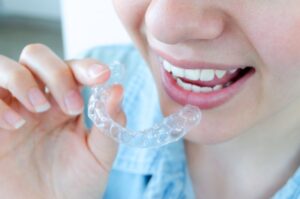
Invisalign treatment comes with a lot of benefits, including its discreet aligners, its efficiency, and more. However, just like any other medical treatment, you must consider both its pros and cons before you make any commitments. In some cases, Invisalign causes complications. What complications can arise, and how can you decide if Invisalign is right for you? This blog post provides some helpful information.
Pain and Discomfort
Invisalign aligners are designed to gradually shift your teeth to their desired positions. This process can cause some level of pain and discomfort, especially during the first few days of wearing a new set of aligners. You may experience soreness or pressure as your teeth adjust. While this discomfort is usually mild and temporary, it might still be a concern for some patients.
Speech Challenges
When you begin wearing Invisalign aligners, you might notice changes in your speech. The aligners can feel bulky in your mouth, which may affect your pronunciation and cause a slight lisp. This issue tends to improve as you grow accustomed to the aligners, but it can still be an inconvenient downside in the initial stages of treatment.
Allergic Reactions
While rare, some individuals may experience allergic reactions to the plastic material used in Invisalign aligners. Symptoms can include irritation, swelling, or redness in the mouth. If you suspect an allergy, it is important to communicate with your dentist and explore alternative treatments that suit your needs.
Flare-ups of TMJ Disorder
If you have a history of temporomandibular joint (TMJ) disorder, Invisalign aligners may exacerbate your symptoms. The pressure applied to your teeth during the treatment may lead to jaw pain, clicking, or difficulty in opening and closing your mouth. It would be wise to consult your orthodontist regarding TMJ concerns before you begin Invisalign treatment.
On the other hand, Invisalign might ultimately provide long-term relief from TMJ disorder symptoms. As it aligns your teeth, it can reduce pressure on your jaw joint and help all your oral structures to work in harmony.
Cavities and Gum Disease
Wearing Invisalign aligners requires strict oral hygiene practices. If you neglect proper care, you may find yourself at a higher risk of cavities and gum disease. Food particles and bacteria can become trapped between your teeth and the aligners, creating conditions conducive to tooth decay and gum problems.
Weighing the Pros and Cons of Invisalign
On the whole, the advantages of Invisalign treatment far outweigh the downsides for most patients. If you would like help to determine if that is true in your case, talk to a qualified Invisalign provider. You will then be able to make a well-informed decision about how to straighten your teeth.
Meet the Practice
At Comprehensive Dental Associates of Central Connecticut, we are proud to offer Invisalign clear aligners and many other services. We are happy to answer our patients’ questions about any treatment we recommend. To learn more about your orthodontic options or to request an appointment, contact our East Hartford office at 860-288-5786.
